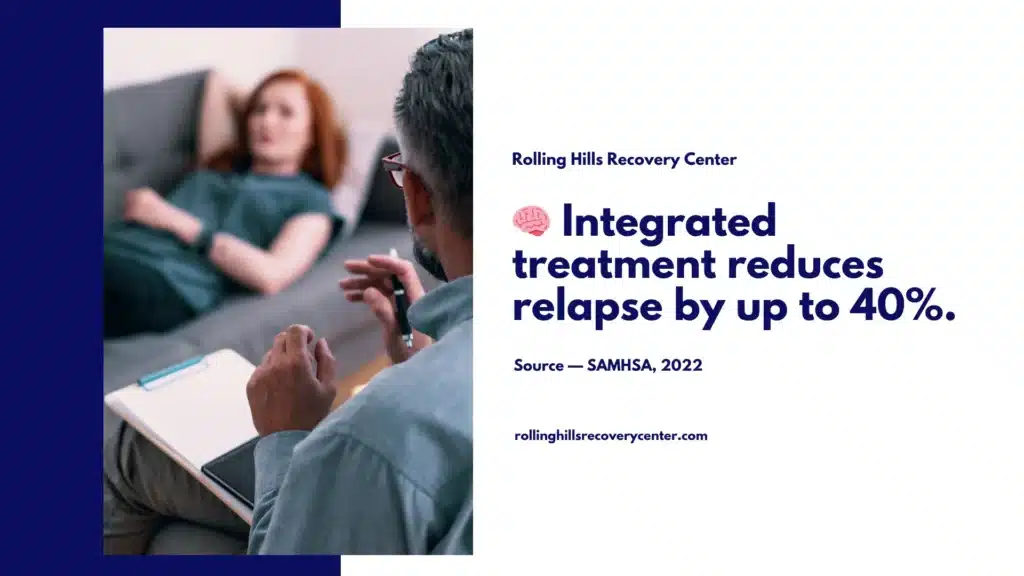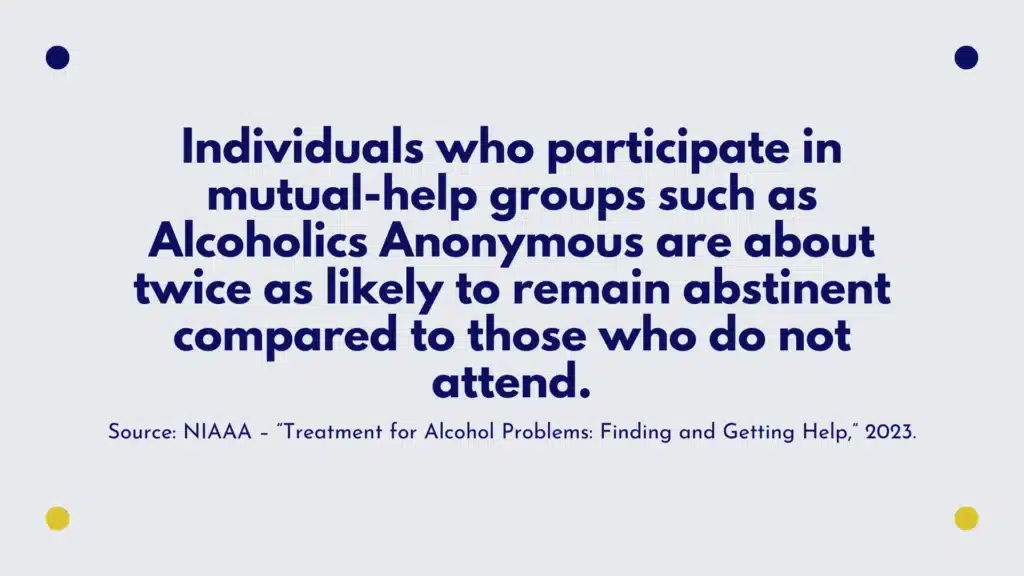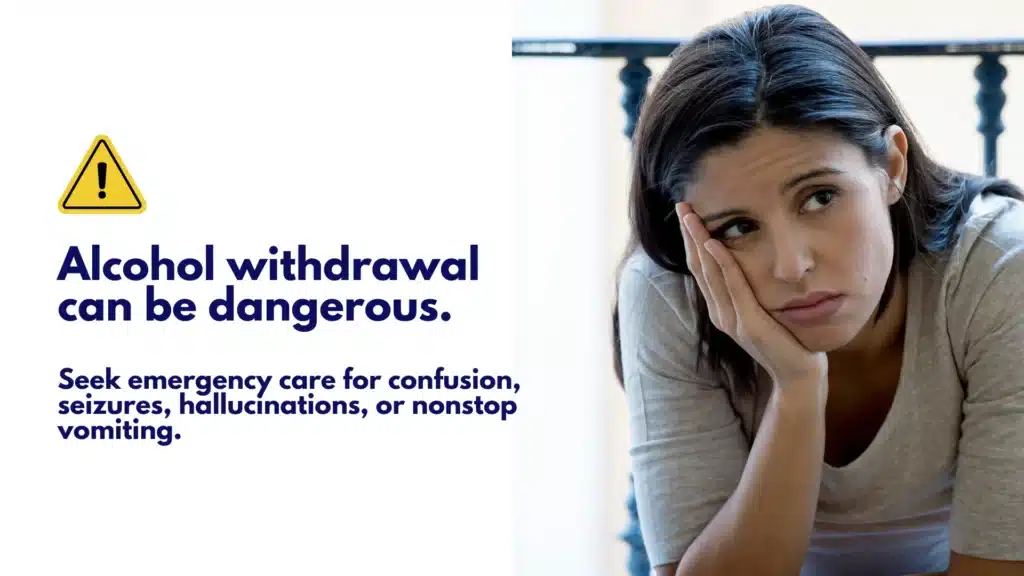Alcoholics Anonymous in New Jersey offers peer support that can complement medical care for alcohol use disorder. This overview explains how AA works, meeting types, and what newcomers can expect across Area 44 and Area 45. It also covers safety, etiquette, and ways to coordinate AA with detox, medications & therapy, and crisis resources.
Key Takeaways
- AA in New Jersey provides peer support that complements, not replaces, detox, meds & therapy.
- Find meetings fast with the AA Meeting Guide app and the Northern (Area 44) and Southern (Area 45) sites; in-person, online, or hybrid. Verify last-minute changes; use filters like accessibility, Spanish, women’s, and LGBTQ+.
- First visits: open vs closed meetings; sharing is optional; respect anonymity; no fees, 7th Tradition is voluntary; ask for a temporary sponsor and consider a home group; court slips can be signed.
- Safety matters: watch for withdrawal warnings, confusion, seizures, hallucinations, severe tremor, nonstop vomiting; call 988 for a mental health crisis and 911 for emergencies; coordinate AA with clinicians, document attendance when needed.
Overview of Alcoholics Anonymous in NJ
What Alcoholics Anonymous is (and is not)
Alcoholics Anonymous (AA) is a peer-led fellowship for people who want to stop drinking and stay sober. It is built around two core frameworks:
- The 12 Steps: a set of spiritual principles focused on honesty, willingness, amends, and ongoing personal growth.
- The 12 Traditions: guidelines that protect AA’s unity and purpose (including anonymity, autonomy of groups, and non-affiliation).
Key features:
- Anonymity: first names only in meetings; sharing is voluntary.
- Peer support: no professional counselors, no dues or fees. Groups are self-supporting through voluntary donations.
- Non-clinical: AA does not provide medical care or therapy, and it is not allied with any institution. It complements, not replaces, professional treatment.
For many, AA works best alongside a treatment plan. At Rolling Hills Recovery Center, evidence-based care (detox placement when needed, medication management, therapy, and holistic supports) can be paired with meeting attendance to reinforce change between sessions.
How New Jersey AA is Organized: Area 44 & Area 45
New Jersey AA service is generally split into two Areas:
- Area 44 (Northern New Jersey): covers the northern counties; maintains meeting schedules, district contacts, and hotlines by county.
- Area 45 (Southern New Jersey): covers the southern counties and the Shore; maintains meeting lists, events, and service contacts.
Together, Areas 44 and 45 provide statewide coverage for in-person and virtual meetings. County intergroups and districts may also host local phone lines and up-to-date lists.
Common Meeting Formats
Meetings vary. Most last 60–90 minutes:
- Open meetings: anyone may attend, including family, friends, or professionals.
- Closed meetings: only for those who have a desire to stop drinking (or think they might have a problem).
- Speaker: one or more members share their story.
- Step/Tradition study: focused discussion around a Step or Tradition.
- Discussion: group members share on a topic or reading.
- Beginner/Newcomer: designed for those within their first months.
- Specialty: women’s, men’s, LGBTQ+, young people, Spanish-speaking, ASL-interpreted, and more.
- Online and hybrid: via Zoom or similar platforms, sometimes with an in-person option.
What to Expect at a First Meeting
- Arrival: expect a greeter at many meetings. You can take a seat and listen. No obligation to share.
- Format: the chairperson typically reads the AA Preamble and describes the format. Some meetings read from AA literature.
- Sharing: you may pass if called on. “No cross-talk” is common etiquette; members do not directly advise during shares.
- Anonymity: photos and recordings are not allowed. Please protect others’ privacy.
- Newcomer focus: many groups ask if newcomers want phone numbers or temporary sponsors. You can ask questions after the meeting.
- 7th Tradition: a basket or digital tool may be used to collect voluntary contributions; newcomers are not expected to donate.
If you need a court slip signed, ask the secretary before or after the meeting. Most groups that sign will have a process.
How AA Complements Detox, Medication Management, and Therapy
- Medical detox: alcohol withdrawal can be dangerous. Detox stabilizes the body; AA offers community support before, during, and after.
- Medication management: medications like naltrexone, acamprosate, or disulfiram may reduce cravings or help maintain abstinence. AA meetings, sponsors, and a home group can reinforce daily recovery behaviors.
- Therapy: cognitive-behavioral therapy, motivational interviewing, family therapy, and trauma-informed care address underlying issues. AA lets individuals practice sober coping in real life between sessions.

Rolling Hills Recovery Center coordinates care plans that include AA attendance when it fits an individual’s goals and preferences, because recovery is stronger when clinical care and community support work together.
Finding New Jersey Meetings Fast

Quick Takeaways
- Coverage: New Jersey meetings run across both Areas, Area 44 (North) and Area 45 (South).
- Formats: in-person, virtual, and hybrid options are available.
- Accurate lists: the AA Meeting Guide app aggregates real-time listings from Areas & Intergroups.
- Filters: search for accessibility (wheelchair access), meeting type (closed/open), language, women’s, LGBTQ+, and young people’s meetings.
- Hotlines: Area hotlines help find same-day meetings and answer questions.
- Confirm details: check last-minute venue changes or Zoom passcodes on the day you plan to attend.
Step-by-Step: Using the AA Meeting Guide App
- Install the AA Meeting Guide app from your phone’s app store or visit the listing at AA Meeting Guide.
- Allow location or enter a New Jersey town (e.g., Newark, Trenton, Cherry Hill, Toms River, Atlantic City).
- Use filters:
- Day and time.
- In-person, online, or hybrid.
- Meeting format (open, closed, beginner, step).
- Accessibility (wheelchair), gender-specific, LGBTQ+, and language.
- Tap a meeting to view:
- Address or online link.
- Format, type, notes (e.g., “enter via side door,” “ASL interpreter,” or “no court card”).
- Group contact or hotline number, if listed.
- Add to calendar. Save the backup option (a second meeting nearby).
- On the day of, recheck the listing for any updates, especially for hybrid or online links.
Tip: If a meeting is canceled or moved, the app typically reflects changes quickly. If in doubt, call the listed contact or a local hotline.
Step-by-Step: Using Area 44 & Area 45 Websites and Hotlines
- Area 44 (Northern): browse by county and district to find local schedules and phone lines. Many counties post downloadable PDFs with weekly meetings.
- Area 45 (Southern): visit Southern New Jersey Area 45 for group finders, service activities, and events.
- Hotlines: county intergroup sites often list 24/7 phone lines staffed by AA members who can point you to a nearby meeting now.
How to use them:
- Identify your county.
- Check the Area site or local intergroup for a schedule. Filter by city, day, time, and type.
- For same-day needs, call the hotline. Ask for in-person meetings within the next few hours; request a second option.
- For virtual, ask for a Zoom ID/passcode and whether it’s open or closed.
Confirming Last-Minute Changes and Hybrid Options
- Re-openings, weather, and site renovations cause temporary shifts.
- If the meeting is marked hybrid, confirm:
- Exact room and floor for in-person.
- Updated Zoom link for online.
- When traveling, select two backup meetings. Save contacts if a group offers a callback.
Accessibility and Language Filters
- Accessibility: look for wheelchair access and bathroom accessibility notes.
- Language: Spanish, Portuguese, Russian, and other language meetings exist in New Jersey. The app and Area lists often label them.
- Specialty: women’s, LGBTQ+, young people’s, and “living sober” groups can enhance comfort and safety. If you want an affirming meeting, search accordingly or ask the hotline.
Consider specialized support if you identify as LGBTQIA+. Rolling Hills Recovery Center maintains dedicated programming that aligns with AA participation; see our page on LGBTQIA support in New Jersey.
Getting Started & Staying Engaged
How to Call a Hotline (and What to Say)

- Find your county or Area hotline number via the app or Area website.
- Call, even late at night. Most are 24/7.
- Say:
- “I’m looking for an AA meeting in [town].”
- “I prefer [open/closed] and [in-person/online].”
- “Do you have beginner-friendly meetings today or tomorrow?”
- Optional: ask about court slip signing.
- Repeat back the information, including address, time, and entry notes.
- Write down a backup option.
If you’re feeling unsafe or at risk of withdrawal complications, call 911 or go to the nearest emergency department first.
Read the Preamble and Pick Beginner-Friendly Meetings
- The AA Preamble is often read at the start. Listening to it can clarify AA’s purpose and limits.
- Look for meetings labeled “beginner,” “newcomer,” or “Step 1–3.” Early recovery meetings often allow basic questions.
- A Step study may help you learn the language and structure, while a discussion meeting can offer relatable stories.
Sponsors and Temporary Sponsors
- Temporary sponsor: someone who helps you get oriented during the first weeks. It can be a bridge until a permanent sponsor is found.
- How to ask:
- At the end of a meeting, say: “Is anyone available as a temporary sponsor?”
- If yes, exchange phone numbers and agree on next steps (daily check-ins, reading assignments).
- What to look for:
- Same gender when possible (many groups suggest this for comfort and boundaries).
- Someone who has worked the Steps.
- Availability that matches your schedule.
Choose a Home Group
- After trying several meetings, choose one group where you show up consistently.
- Benefits:
- Regular support network.
- A place to do service (greeting, making coffee, and distributing literature).
- Accountability and belonging.
- How to join:
- Ask the chair: “How do I become a home group member?”
- Give your first name and phone number if you’re comfortable.
- Start small with a service commitment.

Basics of Meeting Etiquette
- Arrive on time. Silence your phone.
- Introduce yourself by first name only, if you choose to share.
- Avoid cross-talk, share your own experience, do not interrupt or directly advise.
- Respect anonymity. What you see and hear stays in the meeting.
- Avoid strong scents in closed spaces; some members have sensitivities.
- If you must leave early, sit near the door and slip out quietly.
Court Slips and Documentation
- Many meetings will sign a court card or attendance slip. Some will not.
- Steps:
- Ask the secretary before the meeting whether they sign.
- Carry your slip and a pen.
- Request a signature at the end, or as directed by the group.
- Online meetings: procedures vary. Some groups provide a digital signature after verifying your attendance; others do not. Confirm in advance.
For ongoing documentation needs, maintain your own log (date, meeting name, location/Zoom ID, chair if known). Keep copies for legal or employment purposes.
7th Tradition and Donations
- AA is self-supporting. The 7th Tradition basket may circulate, or a QR code may be posted for digital contributions.
- Newcomers aren’t expected to give. Donate when you can, and only if you choose.
Privacy, Safety, and Transportation
- Privacy:
- Do not take photos or tag locations on social media.
- Avoid sharing someone else’s story outside the room.
- Safety:
- Choose meetings that feel comfortable. Specialty meetings (women’s, LGBTQ+, young people) may feel safer.
- If a situation feels inappropriate, speak with a trusted member or the group’s chair.
- Transportation:
- If driving is not an option, use New Jersey Transit, rideshares, or ask a member about local carpool culture.
- For online meetings, confirm audio/video settings and a quiet space in advance.
If you want family members involved in recovery support (while you attend AA), Rolling Hills Recovery Center offers options for loved ones. Learn more about family support services at RHRC.
Clinical and Safety Considerations

When to Seek Urgent Medical Care for Alcohol Withdrawal
Alcohol withdrawal may be dangerous. Seek emergency medical care or call 911 if you notice:
- Confusion or disorientation
- Seizure
- Hallucinations (seeing or hearing things not there)
- Severe tremors, profuse sweating, rapid heart rate
- Vomiting that won’t stop, or dehydration
- Worsening agitation or inability to keep fluids down
Do not rely on AA alone if you have a history of severe withdrawal, seizures, delirium tremens, or significant medical conditions. A medical evaluation should come first. Detox may be needed before attending meetings.
Coordinating AA with Clinicians
- Let your therapist, physician, or care team know you plan to attend AA. Align on:
- Medication plan (e.g., naltrexone, acamprosate, disulfiram) and potential interactions.
- Safety plan for high-risk periods (evenings, weekends, payday).
- Measurable goals (e.g., meetings per week, sponsor contact, home group attendance).
- Share a weekly schedule so your team can help problem-solve barriers (transportation, childcare, work hours).
- If you are in treatment for alcohol use disorder at Rolling Hills Recovery Center, your clinician can help tailor an AA-integrated routine that fits your stage of change.
Using 988 and Crisis Resources
- If you feel suicidal, in severe emotional distress, or need immediate support, call or text 988 Suicide & Crisis Lifeline.
- For medical emergencies, call 911 or go to the nearest emergency department.
- If cravings feel unmanageable right now:
- Call a hotline to locate the nearest meeting.
- Reach out to a temporary sponsor or a supportive peer.
- Use safe coping tools (hydration, food, rest) while you arrange care.
Documenting Recovery Activities for Work or Legal Needs
- Keep a simple log:
- Date/time, meeting name, format (in-person/online), and location/Zoom ID.
- Whether a slip was signed (keep copies).
- Ask your clinician to include AA participation in your treatment plan and visit summaries when appropriate.
- For court or workplace requirements, clarify expectations in writing. Some authorities require specific formats or signatures.
Tools, Templates, and a Quick Comparison
Simple Weekly Meeting Plan Template
Use this basic template to structure your first 2–4 weeks:
- Goal: 90 meetings in 90 days (if possible) or a steady minimum (e.g., 4–5 per week).
- Specialty match: pick at least one meeting that aligns with your identity or needs (e.g., women’s, LGBTQ+, young people, Spanish-speaking).
- Backup: schedule one alternate per day in case something changes.
Weekly plan (example):
- Monday: 7 pm Beginner (in-person, near work). Backup: 8 pm online Step meeting.
- Tuesday: 6:30 pm women’s meeting (hybrid). Backup: 7:30 pm open discussion online.
- Wednesday: 7 pm home group (in-person). Service: arrive early to greet.
- Thursday: 12 pm online discussion during lunch break.
- Friday: 7:30 pm speaker (in-person). Ask about a temporary sponsor list.
- Saturday: 10 am Step study (in-person). Coffee with a member afterward.
- Sunday: 5 pm young people’s meeting (hybrid). Review weekly goals.
Track attendance in your log. Share with your clinician if appropriate.
Comparison Table: Meeting Types and Best Uses
| Meeting type | Who can attend | Best for | Notes |
|---|---|---|---|
| Open | Anyone | Family can observe; flexible schedules | Good for introducing loved ones |
| Closed | Those who have a desire to stop drinking | Personal sharing; privacy | Often preferred in early recovery |
| Beginner/Newcomer | New to AA or returning | Orientation; questions | Often has temporary sponsor lists |
| Step/Tradition Study | Any AA member | Learning AA structure | Helpful for building a sober routine |
| Speaker | Any AA member; sometimes open | Inspiration, hearing stories | Often larger groups |
| Specialty (women’s, LGBTQ+, young people, language-specific) | Any AA member within the group’s focus | Safety, comfort, identity-affirming spaces | Recheck link and room details day of |
| Online | Anyone, depending on type (open/closed) | Access from home; travel/childcare constraints | Confirm passcodes; mind privacy |
| Hybrid | Anyone, depending on type | Local community + virtual option | Recheck link and room details day-of |
Helpful Resources
- AA Meeting Guide: real-time listings for in-person, hybrid, and online meetings.
- Northern New Jersey Area 44 Meeting Finder: county-by-county meetings, intergroups, and hotlines.
- Southern New Jersey Area 45: meeting info, service events, and contacts.
- NIAAA Rethinking Drinking: evidence-based tools to assess alcohol risk and set goals.
- 988 Suicide & Crisis Lifeline: call or text 988 for immediate emotional support.
Conclusion
Alcoholics Anonymous offers steady peer support and works alongside medical care… Key takeaways: try newcomer-friendly meetings, confirm schedules & safety, coordinate with clinicians. Stay consistent, ask for help, and document progress when needed.
Disclaimer: Rolling Hills Recovery Center is not affiliated with Alcoholics Anonymous.
Frequently Asked Questions (FAQs)
What is Alcoholics Anonymous, and How Does it Help with Recovery?
Alcoholics Anonymous is a peer-led fellowship for people who want to stop drinking and stay sober. It uses the 12 Steps and 12 Traditions, anonymity, and mutual support.
From a clinical standpoint, AA can complement medical care, detox, medications for alcohol use disorder, and therapy by adding daily structure, sober peers, and accountability.
Meetings are usually open (anyone may attend) or closed (only for those who have a desire to stop drinking), with formats like speaker, discussion, or step study.
How Can Someone Find Alcoholics Anonymous Meetings in NJ fast?
To locate meetings today, use the AA Meeting Guide app, Area 44 (North) and Area 45 (South) websites, or local hotline numbers.
Search by town, day, time, and format; filter for accessibility, Spanish, women’s, LGBTQ+, young people, or hybrid options. Verify listings before you go, time and location can change.
If transportation is a barrier, consider virtual meetings & phone meetings as a start. Arrive a few minutes early if possible.
What Should be Expected at a First Alcoholics Anonymous Meeting?
A first visit to Alcoholics Anonymous is simple. A chairperson opens with the AA Preamble, readings, then a topic or speaker.
Attendees introduce themselves by first name only; sharing is optional. No fees, 7th Tradition contributions are voluntary. Court slips can be signed when requested by the court.
Basic etiquette: avoid cross-talk, mute on virtual calls, respect privacy & safety. If new to AA, asking about a temporary sponsor is common and helpful.
When is Medical Care Needed Instead of Only an AA Meeting?
AA offers peer support, but alcohol withdrawal can be dangerous. Urgent medical care is needed for warning signs such as confusion, seizures, hallucinations, uncontrolled vomiting, or severe tremor.
Evidence-based withdrawal management may include monitored detox, medications (for example, benzodiazepines when indicated), fluids, and electrolytes.
After stabilization, Alcoholics Anonymous can be layered in with therapy & medications for relapse prevention. In an immediate crisis, calling 911 is appropriate; 988 can help with thoughts of self-harm.
Author
-
Our editorial team includes licensed clinicians and board-certified addiction specialists. Every article is written and reviewed to be clear, accurate, and rooted in real treatment experience.
View all posts -
Dr. Williams has held senior leadership positions in the behavioral health field for over 30 years. He has worked with diverse populations in various private and public sectors.
View all posts












